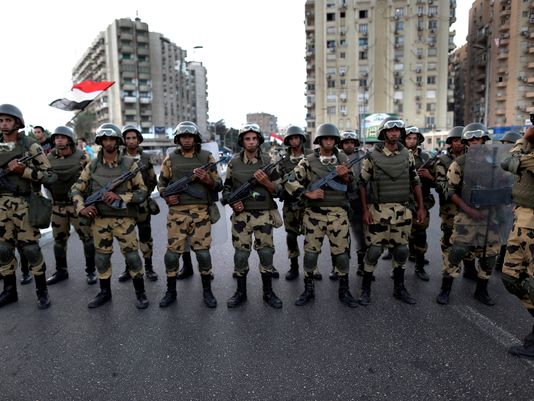CSMS Magazine
There’s no need to recap the news out of Cairo, Egypt. By now, I believe, all of you are already aware of the dramatic reversal of power, through a military coup, that took place yesterday in that historic Arab country. After weeks of mounting discontents against the ineffective rule of President Mohamed Morsi, the military moved in, ousted the democratically elected president, arrested more than 300 of his supporters, suspended the constitution, dissolved the parliament and installed Chief Justice Adly Mansour as interim president.
The military putschists claimed their move was justified for they only intervened to prevent a total collapse of law and order. In the words of the Egyptian army chief of staff, Abdel Fattah al-Sisi, “Our action is nothing but a correction of democracy. We are in no way interested in holding on to power.” A correction of democracy? Since when coups can be used to fix democracies on the brink of deviation? In acting this way, the Egyptian Army is positioning itself as guarantor of democracy—a democracy according to its liking, totally conformist, bent on protecting the interests of the big business establishment and that of the multinational corporations operating around the Suez Canal, strategic zone for the United States and other western powers.
An explosive situation
 While the Gulf kingdoms have already applauded the removal of Morsi, millions of citizens around the world opposed the move, including Turkey, Iran and the republics of Central Asia. In Washington, the reaction was rather embarrassing, dubious at best. There was no firm rebuke to the coup. President Obama, in a carefully written statement, urged the coup plotters to “quickly return power to civilian rule,” implicitly endorsing the putsch.
While the Gulf kingdoms have already applauded the removal of Morsi, millions of citizens around the world opposed the move, including Turkey, Iran and the republics of Central Asia. In Washington, the reaction was rather embarrassing, dubious at best. There was no firm rebuke to the coup. President Obama, in a carefully written statement, urged the coup plotters to “quickly return power to civilian rule,” implicitly endorsing the putsch.
Three weeks ago, in a lengthy article entitled “Arabia: mirage or revolution,” I cautioned on the issue of leaderless revolts. What is now going on in Egypt is the accomplished prophecy of what was said in that article. Two years ago, the people took to the streets of Egypt and ousted former military dictator Hosni Mubarak. Now, the same people are out in force to cheer the same military after it staged a coup supposedly on their “behalf.”
One can be certain they will be out again once the Army begins to move against them as it was the case a year ago when Marshal Tantawi sent the men in the iron gloves to crush demonstrators who demanded justice for their comrades jailed without causes. The Egyptian military is a reactionary entity made up of oligarchs whose interests are diametrically at odds with that of the masses who wallow every day in abject poverty. One can surely infer that Morsi’s presidency was doomed from the start.
In a popular struggle, there are two paths: one that is conducted through the barrel of a gun and one that is crafted to seize power through the ballet box. In either case, stooges and reactionaries have no place. Traitors they have been, traitors they will forever remain. In Egypt and in other places like in Haiti for instance, the absence of a poplar vanguard led the people to take matters into their own hands, leaving them utterly vulnerable to all forms of exploitations. Politic is an art, a scientific undertaking. To win, one must not only know the rules, he also must have the wherewithal. The struggle can never be won simply through the urges of emotion. Come on!! How many more times will the masses have to do this? How many more of their children will have to be senselessly perished before they realize that their only salvation is the creation of their own political party—democratic and participatory—with the sole aim of seizing power?
seize power through the ballet box. In either case, stooges and reactionaries have no place. Traitors they have been, traitors they will forever remain. In Egypt and in other places like in Haiti for instance, the absence of a poplar vanguard led the people to take matters into their own hands, leaving them utterly vulnerable to all forms of exploitations. Politic is an art, a scientific undertaking. To win, one must not only know the rules, he also must have the wherewithal. The struggle can never be won simply through the urges of emotion. Come on!! How many more times will the masses have to do this? How many more of their children will have to be senselessly perished before they realize that their only salvation is the creation of their own political party—democratic and participatory—with the sole aim of seizing power?
Morsi has failed to ameliorate the living conditions for millions of Egytians, they say. Could he have done better? It is true Morsi’s presidency greatly favored the Muslim Brothers, his own political party, which hindered his administration’s move to change the lives of the average Egyptian. But the biggest problem for Morsi was the fact he was operating in the midst of an entrenched, corrupt bureaucratic machine. He was too weak of a president to change the courses of things, even if the entire electorate voted for him at the time he assumed power a year ago, which was not the case. Morsi did not win an absolute majority. But that doesn’t mean he deserved to be surgically removed from power. In politic, it is a deadly blunder to think that the enemy of my enemy is my friend. In this logic, the enemy of my enemy can only be a circumstantial “ally,” not a friend.
What’s next?
One can be sure there will be reprisal. It’s hard to imagine the Brothers will remain idle, as they watch their prize slipped away. Islamist leaders never buy into the idea of a westernized bourgeois democracy. They only believe in a theocracy. They reluctantly got into the game only when it was clear they could win, and they won. Now, they have been pushed aside, they have no incentive to remain in this political process. As I’m writing this piece, President Morsi remains under house arrest, and his faith is quite uncertain. One thing is certain: Egypt, like the rest of Arabia, is poised to a rocky descent into chaotic madness.
In a message to the nation late Tuesday night, Morsi defended his legitimacy and vowed to stay in the presidency, even if he has to die. According to the latest news, Morsi has been barred from traveling abroad. He was Egypt’s first freely elected civilian president since a group of army officers called “The Free Officers” toppled King Farouk on July 23, 1952.
Note: Dr. Ardain Isma is editor-in-chief of CSMS Magazine. He teaches Cross-Cultural Studies at the University of North Florida (UNF). He is a scholar as well as a novelist. He may be reached at: publisher@csmsmagazine.org


